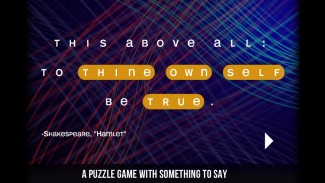Aperture Desk Job
LQ: 8.8
Recommended Age: 8+
Skills Used: Focus, Working Memory, Reading

Alpha Zen is a puzzle game where players must connect a series of words to recreate famous sayings and phrases. Players can rotate words vertically and horizontally in order to get a good match. However, like a crossword puzzle, no letters can touch that do not form words. In addition, players must work to fit their words into a existing grid space — which is often much smaller than the game screen. Alpha Zen becomes increasingly more difficult as the levels progress and more words are introduced. While players can only access on of six chapters in the free version, they still get to play a total of 20 level. There are 6 more chapters, each with 20 levels available for $.99. Not only will players become more familiar with meaningful quotations and idioms, they will also get to practice their flexibility skills in a game that is all about trial and error. There is no inappropriate content in Alpha Zen, but due to the length and difficulty of some of the words and phrases, it is recommended for children 8 and older.
Teachers: check out the classroom guide!
Adapting and adjusting to changing conditions and expectations, especially adapting to obstacles.
 Players are always tweaking and adjusting the placement of the words on the screen. Especially when there are more than four words, finding the right way to arrange and order them can be quite difficult. It's a game of constant trial and error, where players may have to shift the order and placement of every word until they are able to connect them all. Players have to rule out certain moves to avoid taking too long -- although there is no time limit. Rotating the words makes gameplay even more difficult, as players are tasked to determine whether a word is best used horizontally or vertically. Succeeding in Alpha Zen takes patience, concentration, and the ability to change their initial arrangement if it's not working out.
Players are always tweaking and adjusting the placement of the words on the screen. Especially when there are more than four words, finding the right way to arrange and order them can be quite difficult. It's a game of constant trial and error, where players may have to shift the order and placement of every word until they are able to connect them all. Players have to rule out certain moves to avoid taking too long -- although there is no time limit. Rotating the words makes gameplay even more difficult, as players are tasked to determine whether a word is best used horizontally or vertically. Succeeding in Alpha Zen takes patience, concentration, and the ability to change their initial arrangement if it's not working out.
Getting started and then maintaining attention and effort to tasks, especially shifting attention.
 While players should always be mindful of the end goal: solving each puzzle, and eventually completing a chapter -- there are aspects of play that require users to demonstrate keen concentration. For example, players should key in when words contain letters like 'W," "Z," and "Q." Because these letters are used less frequently, they can make or break a puzzle. Words like "towel" and "wool" should always be combined at the "W." Understanding that letters which appear with less frequency should be paired together can make solving the more difficult puzzles much easier. Players have to pay attention to words that contain such letters, and try and combine them first. The rest of the puzzle will come together relatively quickly. But it's all about zeroing in on the subtleties, rather than trying to retrofit words together.
While players should always be mindful of the end goal: solving each puzzle, and eventually completing a chapter -- there are aspects of play that require users to demonstrate keen concentration. For example, players should key in when words contain letters like 'W," "Z," and "Q." Because these letters are used less frequently, they can make or break a puzzle. Words like "towel" and "wool" should always be combined at the "W." Understanding that letters which appear with less frequency should be paired together can make solving the more difficult puzzles much easier. Players have to pay attention to words that contain such letters, and try and combine them first. The rest of the puzzle will come together relatively quickly. But it's all about zeroing in on the subtleties, rather than trying to retrofit words together.
All membership plans come with full access to our entire suite of tools learning guides, and resources. Here are a few of the ones we think you’ll like the most: